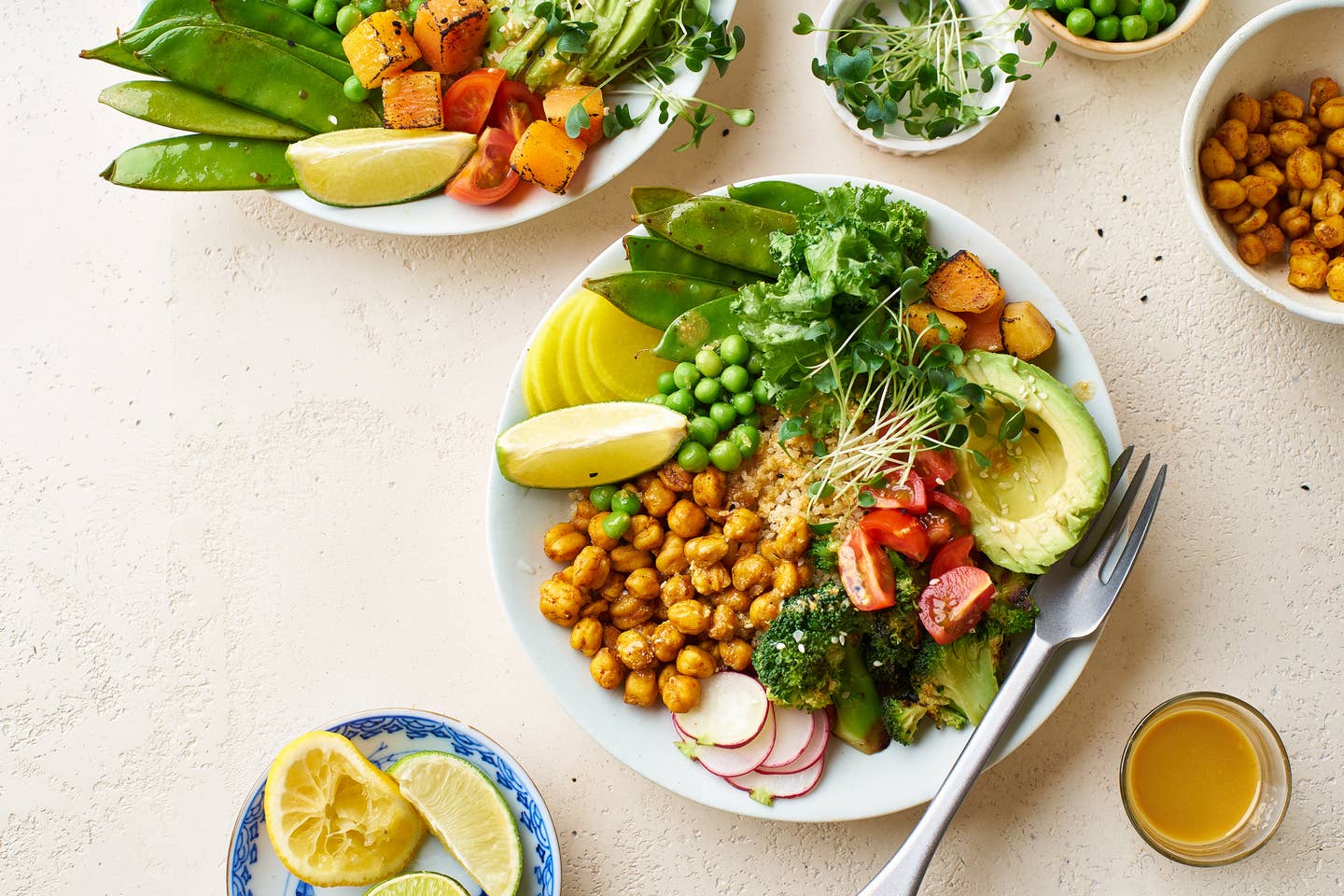
This Doctor is Advocating For Better Culinary Education in Medical Training
Dr. Nisha Patel, MD, MS is an internal medicine physician specialized in culinary medicine. Just a few years ago, she was a busy resident who found out she had concerning changes in her blood sugar and lipid panel during routine blood work. At that moment, she realized she needed to switch her food choices and transition to more healthful eating to regain her health. She took the step to receive additional training in culinary medicine and is now empowering individuals to eat healthily and incorporate more plants in their diet through her platform, @DrPlantel.
We spoke to Dr. Patel about the steps she took to transition to a nutritious plant-based diet, her vision for culinary medicine to be implemented in medical training, and the plant-based meals that have helped her maintain her diet. Inspired by her own experience and training in culinary medicine, she now regularly shares tips, recipes, and resources on how to incorporate dietary and lifestyle changes for optimal health. Dr. Patel exemplifies how the power of plants can heal and nourish the body, reverse, and prevent illnesses like diabetes and heart disease.
The Beet: How long have you been plant-based?
Dr. Nisha Patel: I have been vegetarian all my life but I wasn’t a very healthful vegetarian until about two years ago. I made the switch to a healthy plant-based diet after noticing changes in my own health. During routine blood work, I saw changes in my blood glucose and lipid panel that were concerning. As a South Asian, I have a strong family history of cardiovascular disease and diabetes. I knew if I didn’t make changes now, things would catch up to me sooner than later. Over the past two years, I have made sustainable, healthful changes to my day-to-day eating. It didn’t happen overnight and I am by no means perfect.
TB: Tell us about the first time you were exposed to a plant-based diet.
Dr. Patel: I didn’t fully appreciate the power of a healthy lifestyle, especially when it came to food choices until I made my own healthful eating habits. A healthful lifestyle is the backbone to the treatment of many chronic diseases but unfortunately, it is not emphasized in a practical way in medical training. It was emphasized even less in residency. During residency, you are in fight or flight mode, the focus is just surviving. I definitely didn’t have the healthiest of lifestyle habits.
A healthful lifestyle profoundly improves many diet-related chronic diseases by putting diseases such as diabetes in remission. Unfortunately by the time one is a diabetic, you have lost a portion of your beta-cells, and we really can't replace those. I started by making small changes that made sense to me, changes that felt natural and not forced. I decreased the number of refined carbs I eat and replaced them with carbohydrates from whole grain sources. I have significantly cut back on dairy intake which was my main source of saturated fat. For me, the first step was understanding why certain foods are considered more healthful, this really helped motivate me to make changes.
TB: What strategies helped you stay motivated and consistent with this transition with adopting a plant-based diet?
Dr. Patel: I always like to say small changes add big. Every time I tried to go 0 to 60 mph, it has never worked for me. Each week I would pick one thing I wanted to improve on or change, like including a side of fruits or vegetables with my meal, or swap out white rice for brown rice or quinoa. As above, the first changes I made were slowly replacing my refined grain products with whole grains or legume alternatives. It took some trial and error but I eventually found the brands that I liked and made sense for me. Also, I learned to make these changes in a tasty way that was truly enjoyable. I think this is so important. It is the reason that Culinary Medicine exists and is needed.
TB: Are doctors trained in nutrition and lifestyle medicine while in medical school? Why is it important to incorporate training on this?
Dr. Patel: Unfortunately, nutrition and lifestyle medicine are not emphasized in traditional medical training. This fact is the reason that a whole separate board certification exists. I think there definitely needs to be more emphasis on the importance of healthful lifestyle changes. As I said above, it truly is the backbone of the treatment of chronic disease. It doesn’t have to be either-or. There is a place for lifestyle and evidence-based medicine.
TB: What inspired you to go into culinary medicine? Did you undertake additional training?
Dr. Patel: Honestly, I was looking for a practical way to make healthy eating habits for life and that is the void that Culinary Medicine filled for me. I think of it as the “how-to” of practical nutrition and health education. It is not enough to tell someone to eat healthfully, we have to show them how and work with what they have available to them. A formal Culinary Medicine certification does entail extra training. I think most health professionals who are interested complete it when they are already out in practice. There are some medical schools that are incorporating culinary medicine curriculum into their education but this is not the norm….yet.
TB: What motivated you to build your social media presence and educate others to help regain their health through nutritious eating?
Dr. Patel: I realized there was a need to discuss practical methods to incorporate healthful foods into your day-to-day eating. Also, I felt like if I could do it, anyone could! I was a vegetarian who literally did not like vegetables or fruits. I ate most of my meals during medical training from fast-food restaurants. My goal is to share practical nutrition and health information that people can incorporate into their day-to-day lives.
I also bring awareness to the barriers to healthful eating and social determinants of health such as food insecurity. You will see talk about a wide variety of topics and I love collaborating with my fellow physicians and health care professionals. Debunking myths is important. I have definitely been wrong in the past about my understanding of certain topics related to nutrition science. I am a human too and I openly acknowledge the importance of continued education as science changes and evolving your thinking over time.
TB: What resources do you recommend for someone interested in taking the step to start lifestyle changes and regain their health?
Dr. Patel: I’ll make a shameless plug for my Instagram page, @DrPlantel. There are also free resources on www.healthmeetsfood.com, especially recipes. The Beet is also a great resource, especially for recipes. The Harvard T. H. Chan School of Public Health has a whole website dedicated to practical nutrition information called The Nutrition Source.
TB: Do you have a healthy dish or drink that helped you make the switch to healthful eating?
Dr. Patel: Smoothies have really made it easier and enjoyable to eat more plant-based foods. My favorite smoothie is mixed berries, spinach, two tablespoons of flaxseed powders, water, or oat milk depending on what I am feeling that day.
TB: What is your favorite plant-based breakfast, lunch, dinner, and snack?
Dr. Patel: For breakfast, I do one minute quick oats with oat milk, cinnamon, pecans, and a splash of maple syrup or whole-wheat toast with almond butter and cinnamon. My favorite snack is popcorn. Many people don’t know that popcorn is a whole grain! I buy the kernels and pop it myself. I stay away from the prepackaged popcorn that you pop into the microwave that usually has quite a bit of added salt. For lunch or dinner, it just varies on the day. I love chickpea-based pasta with an assortment of veggies or black bean tacos with avocado sauce. I also am a lentils fanatic, I love all kinds. Lentils are so versatile, you can literally add a wide variety of vegetables, yum!
TB: What words do you live by? Do you have a mantra?
Dr. Patel: Progress not perfection. Food guilt is real and we have to understand that a healthful eating pattern is more important than just focusing on individual foods or nutrients and not every day has to be perfect. We just do our best and keep moving forward!
More From The Beet






